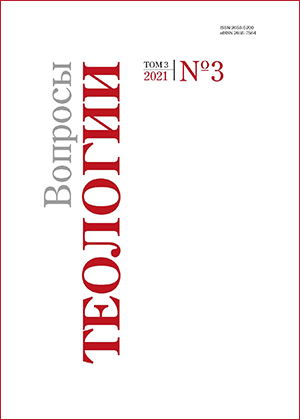Екклесиаст как представитель иудейского теологического образования
DOI:
https://doi.org/10.21638/spbu28.2021.301Аннотация
Данная работа посвящена исследованию личности автора Книги Екклесиаста как представителя теологического образования. Многие западные исследователи предполагают, что ее автор был иудейским учителем — поскольку он называет себя Екклесиастом (греч. ἐκκλησία — собрание людей) или Кохелетом (др.-евр. qahal — собрание), то вполне вероятно, что он собирал людей для обучения. Указание на это имеется и в самой книге: «Кроме того, что Екклесиаст был мудр, он учил еще народ знанию» (Еккл 12:9). Судя по всему, он выполнял функцию учителя молодых людей (Еккл 11:9) и имел группу учеников, которой давал практические советы относительно жизни. Это было время бурных изменений в Израиле, новые реалии требовали новых ответов, и Екклесиаст, изучая Священное Писание и размышляя над ним и над своим личным опытом, производил критический анализ действительности и учений, распространенных среди израильтян. На основании этого анализа он давал ответы молодым людям на сложные вопросы современности, пытаясь сформировать у них целостное представление о мире и уберечь их от соблазнов, наставляя таким образом: «Выслушаем сущность всего: бойся Бога и заповеди Его соблюдай, потому что в этом все для человека; ибо всякое дело Бог приведет на суд, и все тайное, хорошо ли оно, или худо» (Еккл 12:13–14).
Эти слова не потеряли актуальности и сегодня, поэтому данная работа может быть полезной для анализа современной педагогической системы образования через призму иудейской религиозной педагогики, которая, в свою очередь, тесно связана с христианским образованием и направлена на формирование нравственной личности через внутреннее преображение человека и изучение Священного Писания.
Ключевые слова:
Библия, Книга Екклесиаста, Кохелет, образование, смысл жизни, мудрость, суета, польза, благо
Скачивания
Библиографические ссылки
Antonioni B., priest (1994) Prophetic books and books of the Wisdom of the Old Testament. Exegesis of the most important passages. Moscow, Kolledzh katolicheskoi teologii im. sv. Fomy Akvinskogo Publ. (In Russian)
Bartholomew C. (2009) Ecclesiastes. Ada, MI, Baker Academic Press.
Biwul J. K. T. (2017) “The use of hebel in Ecclesiastes: A political and economic reading”, in Theological Studies, vol. 73, iss. 3, pp. 1–10.
Blocher H. (1977) “The Fear of the Lord as the ‘Principle’ of Wisdom”, in Tyndale Bulletin, vol. 28, pp. 3–28.
Boyko A., priest (2016) “The meaning of the opposition of the concepts יְתרוֹן (benefit) and טוב (good) for understanding the Book of Ecclesiastes”, in Tablets, vol. 12, pp. 115–124. (In Russian)
Childs B. (1979) Introduction to the Old Testament as Scripture. Philadelphia, Fortress Press.
Christianson E. S. (1998) A Time to Tell: Narrative Strategies in Ecclesiastes. Sheffield, Sheffield Academic Press.
Crenshaw J. L. (1983) “Qoheleth in Current Research”, in Hebrew Annual Review, vol. 7, pp. 41–56.
Crenshaw J. L. (1987) Ecclesiastes: A Commentary. Philadelphia, PA, Westminster Press.
Crenshaw J. L. (2013) Qoheleth: The Ironic Wink. Columbia, University of South Carolina Press.
De Jong S. (1994) “Qohelet and the Ambitious Spirit of the Ptolemaic Period”, in Journal for the Study of the Old Testament, vol. 61, pp. 85–96.
Enns P. (2011) Ecclesiastes. Grand Rapids, MI, Eerdmans Publ.
Fast G., priest (2009) Commentary on the Book of Ecclesiastes. Krasnoyarsk, Eniseiskii blagovest Publ. (In Russian)
Fox M. V. (2010) A Time to Tear Down and a Time to Build up: A Rereading of Ecclesiastes. Eugene, OR, Wipf & Stock Publ.
Grabbe L. L. (2010) An Introduction to Second Temple Judaism: History and Religion of the Jews in the Time of Nehemiah, the Maccabees, Hillel, and Jesus. London, T&T Clark International Publ.
Hengel M. (1989) The “Hellenization” of Judaea in the First Century after Christ. London, SCM Press; Philadelphia, Trinity Press International.
Hilarion (Alfeyev), metropolitan. (2018) “Jesus Christ as a teacher and modern pedagogical university”, in Vestnik Russkoi khristianskoi gumanitarnoi akademii, vol. 19, iss. 1, pp. 55–62. (In Russian)
Jerome (1880) Commentary on the book of Ecclesiastes, to Paul and Eustochia. Kiev, Kievskaia dukhovnaia akademiia Publ., Tipografiia I. I. Chokolova Publ. (In Russian)
Klassen A., priest (2009) “Scientific and isagogical review of the book Ecclesiastes”, in Fast G., priest. Commentary on the Book of Ecclesiastes, pp. 305–330. Krasnoyarsk, Eniseiskii blagovest Publ. (In Russian)
Krüger Th. (2004) Qoheleth: A Commentary on the Book of Qoheleth. Minneapolis, MN, Fortress Press.
Loader J. A. (1979) Polar Structures in the Book of Qoheleth. Berlin, New York, de Gruyter Publ.
Longman T. (1998) The Book of Ecclesiastes. Grand Rapids, MI, Eerdmans Publ.
Lyavdansky A. K., Barsky E. V. (2008) “Ecclesiastes Book”, in Pravoslavnaia entsiklopediia, vol. 18, p. 224. Moscow, Pravoslavnaia entsiklopediia Publ. (In Russian)
Marrou H. I. (1982) A History of Education in Antiquity. New York, Mentor Books Publ.
Rizhsky M. I. (1995) The Book of Ecclesiastes. In search of the meaning of life. Novosibirsk, Nauka Publ. (In Russian)
Rudman D. (2001) Determinism in the Book of Ecclesiastes. Sheffield, Sheffield Academic Press.
Sacchi P. (2004) The History of the Second Temple Period. Edinburgh, T&T Clark Publ.
Schultz R. L. (1997) “Unity or Diversity in Wisdom Theology? A Covenantal and Canonical Perspective”, in Tyndale Bulletin, no. 48, pp. 271–306.
Schwienhorst-Schoenberger L. (2008) “The Book of Ecclesiastes (Kohelet)”, in Vvedenie v Vetkhii Zavet, ed. by E. Zenger, pp. 494–505. Moscow, Bibleisko-bogoslovskii institut sv. apostola Andreia Publ. (In Russian)
Seow C. L. (1997) Ecclesiastes: A New Translation with Introduction and Commentary. Anchor Bible. New York, NY, Doubleday Publ.
Sergius (Akimov), archim. (2012) “‘What is Good?’: Searching for Good in the Mesopotamian ‘Conversation of the Master with the Slave’ and the biblical Book of Ecclesiastes”, in Tablets, vol. 3, pp. 78–86. (In Russian)
Seyfrbold K. K. (1978) “ הֶבֶל hebhel; הָבַל hābhal”, in Theological dictionary of the Old Testament. In 17 vols. Vol. 3, pp. 313–320. Grand Rapids, Eerdmans.
Shmonin D. V. (2018) Technology of Good: Essays on the Theology of Education. Moscow, Poznanie Publ. (In Russian)
Sun C. (2017) “Ecclesiastes among the Megilloth: Death as the Interthematic Link”, in Bulletin for Biblical Research, vol. 27, no. 2, pp. 185–206.
Whybray R. N. (1989) Ecclesiastes: New Century Bible Commentary. Grand Rapids, Eerdmans Publ.
Загрузки
Опубликован
Выпуск
Раздел
Лицензия
Статьи журнала «Вопросы теологии» находятся в открытом доступе и распространяются в соответствии с условиями Лицензионного Договора с Санкт-Петербургским государственным университетом, который бесплатно предоставляет авторам неограниченное распространение и самостоятельное архивирование.




